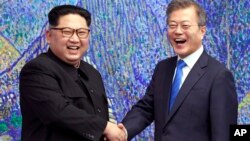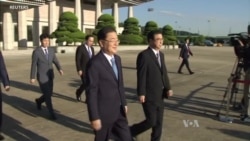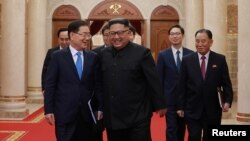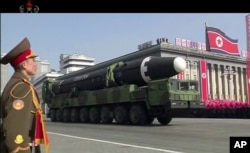South Korean officials say high-level talks are scheduled for early next week between representatives from the two Koreas ahead of a summit set for Sept. 18 through Sept. 20.
South Korea’s national security adviser Chung Eui-yong said next week’s talks will be at the peace village of Panmunjom “to discuss protocol, security, communications and media coverage as a part of preparations for the summit.”
The announcement came one day after a five-person South Korean delegation, led by President Moon Jae-in’s top security adviser, visited the North Korean capital and agreed to the summit dates.
WATCH: Still No Concrete Steps for North Korea's Denuclearization
Wednesday’s meeting took place amid the backdrop of U.S. President Donald Trump’s abrupt cancellation of a trip to North Korea by U.S. Secretary of State Mike Pompeo, because the White House felt Pyongyang had not made sufficient progress toward denuclearization.
The one-day meeting between North and South Korea focused on establishing permanent peace and prosperity on the Korean Peninsula and practical measures of denuclearization.
“Chairman Kim Jong Un reaffirmed his commitment for complete denuclearization of Korean Peninsula,” said Chung, “And expressed his willingness for close cooperation not only with South Korea but also with the United States in that regard.”
Tentative date
Chung also said Kim wished to denuclearize and end hostilities with Washington before 2021, adding that the North Korean leader’s faith in Trump is “unchanged.”
The U.S. president responded on Twitter:
The Seoul and Pyongyang delegations also agreed to take steps to ease military tensions and “decided to reach an agreement at the inter-Korean summit on concrete plans to establish mutual trust and prevent military clashes.”
Chung announced the two governments would open a joint liaison office with resident representatives before the next summit and “continue necessary cooperation,” as well.
No pathways to denuclearization announced
Despite the diplomatic difficulties between Pyongyang and Washington, Seoul continues to encourage both parties to proceed with peace and denuclearization processes.
Troy University International Relations lecturer Daniel Pinkston says Kim’s commitment to denuclearization faces skepticism.
“I don’t see any written commitments,” he told VOA.
“There are a number of written mechanisms, legal mechanisms, and ways they [North Korea] can demonstrate politically and legally that they’re bound to these denuclearization commitments.”
Harry Kazianis, director of defense studies at the Center for the National Interest, doubts Kim will denuclearize but notes a shift from the “fire and fury” days of 2017.
“I do see a lot of hope for a detente on the Korean Peninsula that could be long term,” Kazianis said. He also sees the possibility the Trump administration could make a strategic shift in its policy toward Asia, telling VOA, “I think this administration is much more focused on China now, than it is on North Korea.”
But without North Korean compliance in the arms control and denuclearization arenas, Pinkston says “the United Nations Security Council cannot roll back the sanctions regime.”
Kazianis is doubtful the complete, verifiable, irreversible denuclearization (CVID) will occur, “but there is a lot of ways to lessen tensions with North Korea and to have, what I would call, a working relationship.”
If North Korea commits to arms control, arms reduction, and denuclearization, Pinkston agrees that “there are a number of opportunities” that would eventually open up for North Korea.
Moving forward
The 1950-53 Korean War ended with an armistice, not a peace treaty, leaving the peninsula technically still at war.
President Moon has made an end-of-war declaration an important focus. At the United Nations General Assembly in late September, South Korea seeks a trilateral summit, or possibly a four-nation meeting that includes China, to declare a formal end to the conflict.
Kazianis doesn’t think such a U.N. announcement is likely, but doing so eventually would be tantamount to all sides “agreeing that the war was over.”
If Kim still hasn’t demonstrated more concrete steps toward denuclearization, Kazianis says that would be “a clear understanding that he’s never going to do it.”












